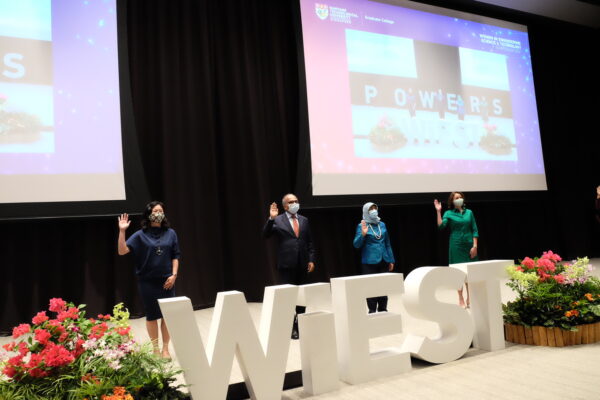
Anne Ong opened an online store in 2017 on Lazada Singapore’s RedMart Speciality Stores to expand the distribution business of her baking premixes.
Called Anne’s Secret Recipes, the business grew and she acquired new customers that she would not get from distributing through supermarkets.
On Lazada, the 56-year-old was able to directly engage with her customers and learned more about their preferences. Her business soon expanded beyond Singapore’s shores and she is now planning to make the premixes halal- and kosher-certified to reach even more customers.
An architect before she turned entrepreneur, Ong received a Creative Seller award from the Lazada Forward Women Awards, an inaugural event to recognise women entrepreneurs, last week.
This year, there were more events on the national level to recognise achievements and contributions of women in tech on International Women’s Day (IWD) which fell on March 8.
More than 50 companies also pledged last week to roll out different programmes to enable a more gender-diverse workforce and create more opportunities for women in tech (WIT).
Called Company Pledge, it was led by SGTech and supported by the Infocomm Media Development Authority (IMDA) and SG Innovate.
At the Nanyang Technological University, new efforts were announced to connect women with role models and mentors, conduct local research to address barriers and gaps, and provide education opportunities.
Called Powers (Promotion of Women in Engineering, Research, and Science) and organised by Women@NTU, it was launched by President Halimah Yacob on March 8. Other companies like Singtel also held their own IWD celebrations.
The activities this year reflect the momentum that has been created since the SG Women in Tech (SGWIT) initiative was launched a year ago by the IMDA. It is the first nationwide WIT movement whose patron is the Minister of Manpower Josephine Teo.
The SGWIT initiative aims to attract, develop and retain female talent in the tech industry. The national initiative is not about balancing the scales between men and women in the workforce.
Rather, it is about encouraging more women to get into tech industry, especially in Singapore where there is a tight labour market. That’s just one reason for the movement – gender diversity also has an impact on business growth.
Wong Wai Meng, CEO of Keppel Data Centres, cited survey findings from Australia which showed that when a company appoints a woman as CEO, there is a five per cent increase in market value.
“If the women leadership positions in the company increases by 10 per cent, market value goes up by 6.6 per cent,” said Wong, who is also the chairman of SGTech at the launch of the Company Pledge last week.
The Australian survey had followed 11,000 companies over six years to establish the link between gender diversity and success.
Gender diversity matters because it leads to better organisational problem-solving and performance, said Lazada’s Chief People Officer, Sophie Xue.
Teams made up of different backgrounds, gender and culture are better placed to spot gaps and solutions than teams that are not diverse, she noted.
“Businesses that do well, cater to the needs and preferences of a wide and diverse range of customers,” she added. “If your customers are diverse, it would make sense that your company reflects the make-up of customers you are serving.”
Isabella Kusumawati, of software firm SUSE, stresses that diversity “improves better decision-making process as women bring skills such as collaboration, multi-tasking, perseverance, and resiliency to the table”.
With these social sensitivities, women can make fair and sound decisions for all parties, said Kusumawati, SUSE’s vice-president and managing director, Southeast Asia.
More work needs to be done
A new BCG study undertaken in 2020 in partnership with IMDA showed that Singapore women’s representation in tech still lags behind other industries in Southeast Asia.
Called Boosting Women in Technology in Southeast Asia, Singapore’s women in tech make up about 41 per cent of the tech workforce compared to 48 per cent overall.
Only 29 per cent of women university graduates work in the tech industry versus 53 per cent overall.
This report also highlighted that that five percent of technology jobs were vacant in the first quarter of 2020, nearly double the vacancy rate of 2.7 per cent in 2010. Including IT and other service-related positions in Singapore, the first-quarter 2020 vacancy rate was even higher, at 6.1 per cent.
The issue of gender diversity is not new. The BCG report, however, hits the nail on the nail on the head.
It rightly says that “the gender gap at technology companies in Southeast Asia is an exacerbated symptom of the broader problems that women face in all industries.”
Thus, IMDA’s launch of the SGWIT initiative is a big step forward and the momentum has carried forward this year. Activities that started last year will have continued this year.
The Singapore Computer Society (SCS) curated a SGWIT100, a list of top women in tech in various roles from business and leadership to community advocates and technologists.
These are the role models and their jobs show what girls and young women can aspire to in a tech career. A new list will be curated in 2021.
Mentoring to provide increased confidence through improved skills and leadership competencies is also being offered under a programme called MentorConnect. IMDA and four other tech companies launched the first edition in 2019.
About 50 women from Dell Technologies, IMDA, Salesforce and ST Engineering took part in the inaugural edition where mentors were senior business leaders from the five organisations. A second edition is in the works.
Organisations are also stepping up to actively support gender diversity through various programmes.
Under the Company Pledge, organisations pledged to rollout women mentorship programmes, promote the tech industry to young girls, set up resource teams and hold courses on unconscious bias. Here are some examples:
• Gaming accessory giant Razer pledged to ensure that a minimum of one female interviewable candidate for positions for senior roles and for fresh graduate/internship opportunities. It will also conduct anti-bias training for all hiring managers.
• The Government Technology Agency pledged to drive mentorship and development of female talents particularly the young and return-to-work groups, to bolster the female tech talent pool.
• Keppel Data Centres pledged to run an Inclusive Leaderships and Behaviours programme for its people managers to learn about sub-conscious biases.
More work remains. Unconscious bias is a hard nut to crack but it is one where women face in all industries. Effort should be made at the start of hiring process to prevent this, suggested Aziza Sheerin, managing director of General Assembly.
During interviews, more weightage could be placed on capabilities where take-home assignments allow candidates to showcase what they can do because some women are quieter at voicing their views but better at showing what they can do.
To encourage more women to move from non-tech to tech jobs, reskilling and skills upgrading schemes would also help, she added.
Jobs in the tech industry in areas like customer management, digital marketing and user interface design are good for women transitioning to tech because they do not require technical ability but need understanding of data, relationship making and a questioning mind. At General Assembly (GA), there is gender parity of participants attending its courses.
Sheerin also introduced a scholarship “See Her Excel” which provides financial support for women pursuing a new career in technology with GA and earning below S$48,000 annually.
Singtel has also set up the Singtel – Women in Technology scholarship scholarships for undergraduates studying at the Singapore University of Technology and Design (SUTD).
Two students studying Information Systems Technology and Design, Engineering Systems and Design (ESD) or Engineering Product Development (EPD) will receive the scholarship. Two students who joined in SUTD in 2019 are the inaugural recipients of this scholarship, which has no bond attached.
Young women also must also play their part. They must never be afraid to share their tech dreams and talk about their aspirations with their bosses, said Tan Lee Chew, president of the SCS WIT Chapter.
“It is easy to allow insecurities like age and experience level to prevent you from thinking big or even admitting that you need help,” said Tan, who is managing director for Worldwide Public Sector, Asean, at Amazon Web Services. “Sometimes, all it takes is for you to ask.”
Young girls too should never let anyone tell them they cannot do something because they are female. Dr Chong Yoke Sin, SCS’ president, advised girls to “always imagine what they can do if there are no boundaries and to focus on being the best that they possibly can be.”






